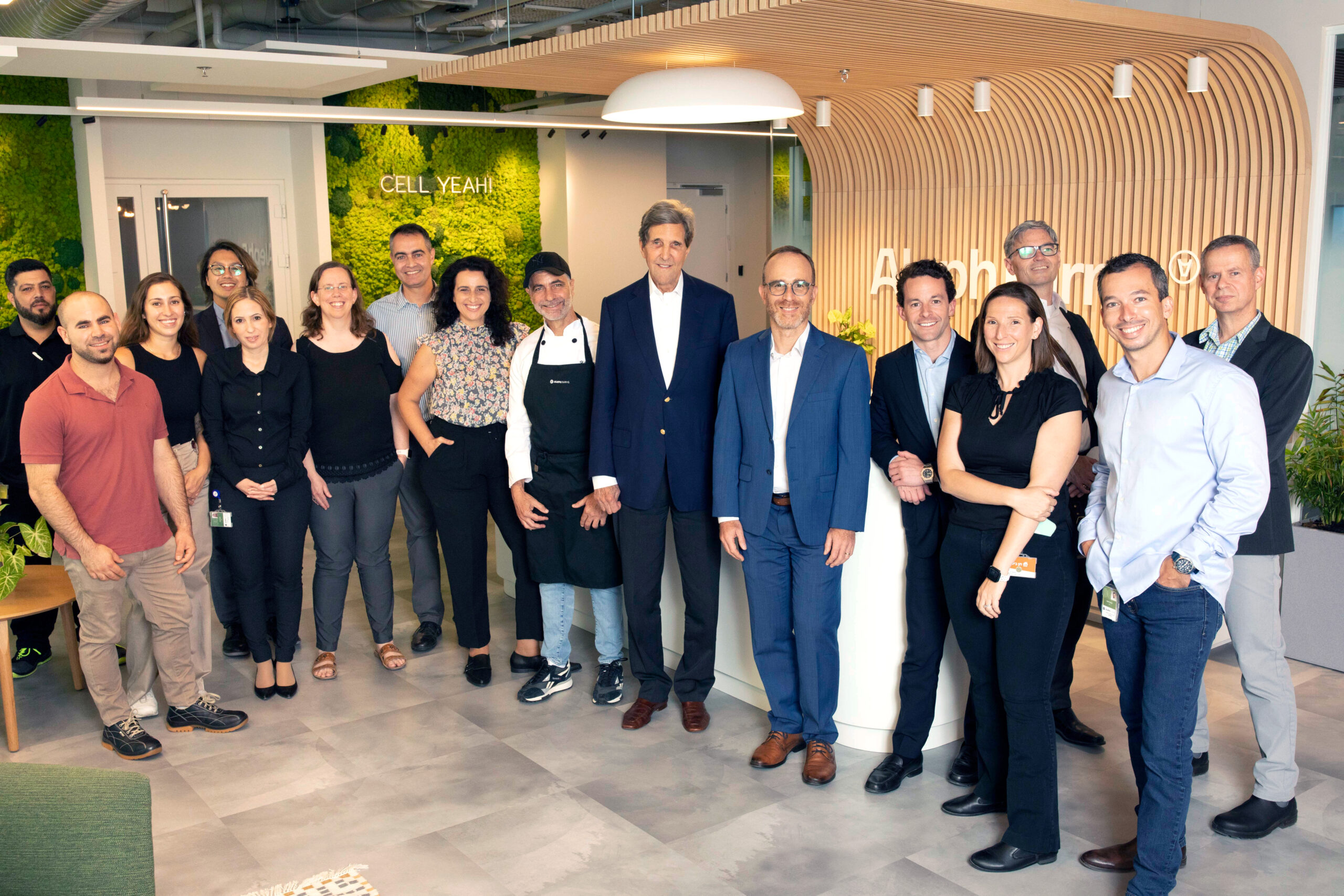
This World Environment Day, Aleph Farms is proud to announce that last Friday, it hosted US Special Presidential Envoy for Climate John Kerry at its HQ in Israel to discuss the role of cellular agriculture, alongside sustainable animal agriculture, in creating more secure and resilient food systems. The visit was part of a larger ongoing trip for Kerry that includes parts of the Middle East and Northern Europe.
While at Aleph’s HQ, Kerry met with senior executives from our sustainability, operations, R&D, and regulatory divisions. They discussed the importance of regional collaboration in addressing food insecurity and climate challenges in the Middle East and furthering policies that can advance meaningful scale-up of novel foods. The visit also included an opportunity for Kerry to enjoy Aleph Cuts, the world’s first cultivated steaks – our first application of animal cells. Kerry tasted our cultivated steak, experiencing firsthand a product slated to help diversify protein production and be part of the inclusive transition to resilient and sustainable food systems.
Climate change is affecting all regions on Earth and is having a disproportionate impact across MENA in particular. Since cultivated meat is grown in closed systems, its production is feasible in locations where harsh climate and resource scarcity prevent conventional animal agriculture from taking place. Such conditions match many areas across North Africa and the Middle East.
Aleph Farms discussed the following prospects with SPEC John Kerry in regard to regional collaboration on climate action and food security:
- Creating a regional authority to oversee a joint food security plan, including a fund for investment in related initiatives
- Harmonization of regulations
- Trade agreements for local and sustainable products
- Regional innovation and training centers
Alongside joint R&D and knowledge sharing, private-public partnerships in the agri-food-tech sector are key for strengthening food security, climate action, and economic growth. To this end, Aleph Farms works with global organizations like the World Economic Forum, the United Nations, FAO, Conventions on Climate Change (COP), AIM for Climate and the N7 Initiative. We also have investors that include sovereign funds, state-backed investment companies and government agencies in the Middle East and Southeast Asia.
Just as Aleph Farms is working to overcome challenges associated with the production of cultivated meat, such as at-scale raw material costs and capital intensive infrastructure, the United States government is also taking action, including through fresh support for producers of cultivated meat. While meeting with SPEC Kerry, Aleph Farms executives emphasized the importance of scaling up production systems for applications of cellular agriculture, as a complement to sustainable practices within animal agriculture. Specifically, they discussed the following efforts:
- Public-private partnerships, including offtake agreements
- Promotion of capital investment in strategic climate action
- Alignment of existing agriculture-related incentives to promote sustainable practices
- Tax incentives and project finance support to promote scale-up and cost reduction of novel and sustainable food production systems (e.g., cellular agriculture)
- Integration of mandatory carbon frameworks that allow novel foods to expedite reduction of methane emissions across food production, helping fulfill the Global Methane Pledge
- Expansion of existing incentives such as various Farm Bill programs, including USDA Business & Industry Loan Guarantees and the Food Supply Chain Guaranteed Loan Program
Last month, at the Agriculture Innovation Mission for Climate (AIM4C) summit in Washington D.C., US Secretary of Agriculture Tom Vilsack noted that USDA’s fund for research on methane reduction is being doubled. USDA has set a goal of transforming U.S. agriculture through science and innovation, as reflected in its research strategies for 2023-2026.
Aleph Farms plays an active role in AIM4C as an Innovation Sprint Partner alongside investors, think tanks, consulting firms and legacy food and beverage brands. We were also exhibitors at the latest summit, where SPEC Kerry remarked on the implications of rising global temperatures on food security and emphasized food’s indispensable role in climate action: “We can’t get to net zero… unless agriculture is front and center as part of the solution. “
